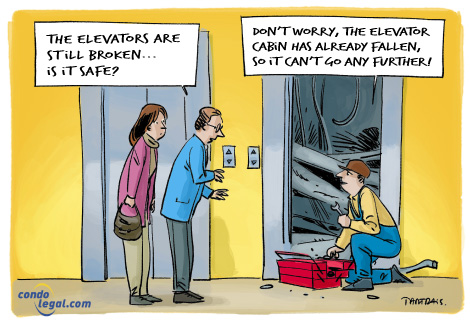Date published: 17/01/2024
Should uninterrupted access to the elevator be guaranteed for people with reduced mobility?
 In our building, we have only one elevator that may occasionally be out of service due to blackouts or power outages. We do not have a generator. Our co-ownership has 40 units, two of which are occupied by residents with reduced mobility. The purchase and installation of a generator would cost a minimum of $200,000. This proposal was presented at the last annual meeting, but the majority of co-owners do not want to pay for it. It should be noted that when the elevator is broken, as is currently the case, these residents cannot leave their homes. We have already put in place accommodations for these people that have not resulted in any cost.
In our building, we have only one elevator that may occasionally be out of service due to blackouts or power outages. We do not have a generator. Our co-ownership has 40 units, two of which are occupied by residents with reduced mobility. The purchase and installation of a generator would cost a minimum of $200,000. This proposal was presented at the last annual meeting, but the majority of co-owners do not want to pay for it. It should be noted that when the elevator is broken, as is currently the case, these residents cannot leave their homes. We have already put in place accommodations for these people that have not resulted in any cost.
Question : So what are the legal responsibilities of directors in this context?
Answer: The situation you describe highlights crucial issues regarding the balance between the needs of people with reduced mobility and the financial constraints of a condominium. This is the case when respect for fundamental rights and freedoms, including the right to substantive equality for persons with reduced mobility, conflicts with the financial capacity of co-owners.
It is important to know that an elevator is first and foremost a means of transport, essential, in the same way as the others, for people with reduced mobility. Thanks to this vertical mode of transport, the elevator allows them to move around at work, but also in various public places (shops, train stations, leisure centres, etc.). Because of an elevator breakdown, does an occupant of the building, in a wheelchair, have to tolerate being trapped in his or her dwelling for an indefinite period of time?
It should be remembered that the administrators of a condominium have the duty to maintain the common areas, which includes the elevator. They must ensure that the work necessary for the conservation and maintenance of the building is carried out. However, they must also take into account the financial capacity of the co-owners to cope with large expenses.
In your case, it seems that most condo owners are not willing to bear the cost of a generator, which would represent an increase of nearly $5,000 in their common expenses. This is undoubtedly a significant sum for many of them.
The question then arises as to whether the costs of approximately $200,000 for the installation of a generator constitute "undue hardship" for the syndicate, which would justify not installing such a generator as a reasonable accommodation. Obligations in this area only apply up to a certain level, and an expense of $200,000 for the installation of a generator can correspond to this concept, especially since it is third parties – the co-owners – who would have to pay a sum of several thousand dollars each. This level may be considered "undue hardship".
In addition, you mention that the elevator is currently broken, but the presence of a generator would not solve all the problems, only the cases of power outages. The obligations of the directors of the syndicate are obligations of means, not of result. They certainly have to act diligently to get the elevator repaired as quickly as possible, but they can hardly force the condo owners to pay for a generator.
Back to questions and answers